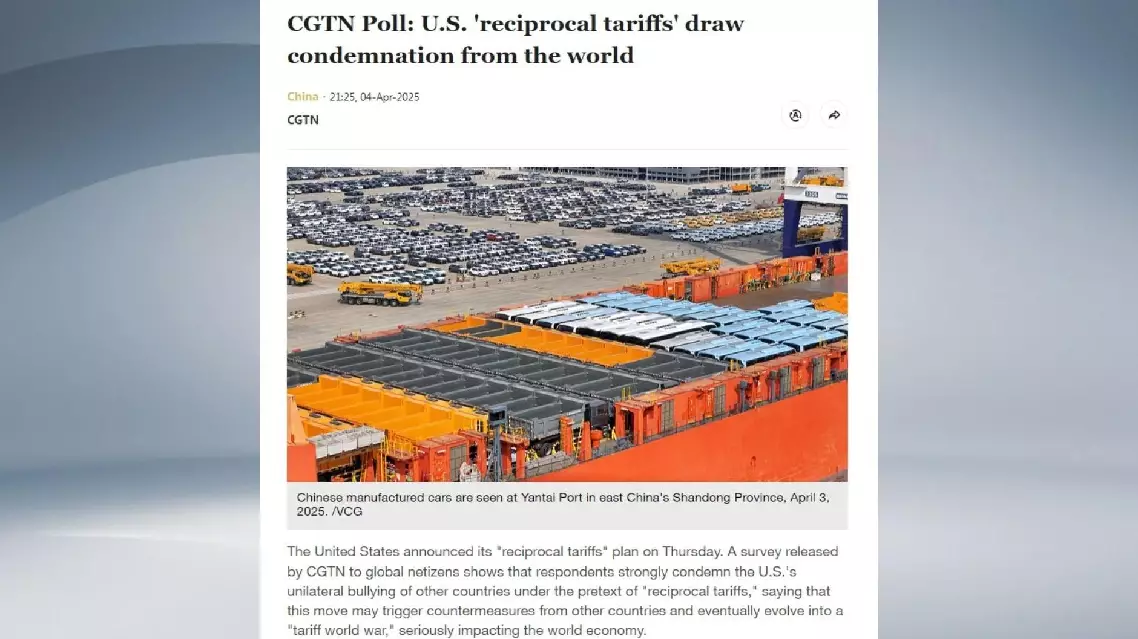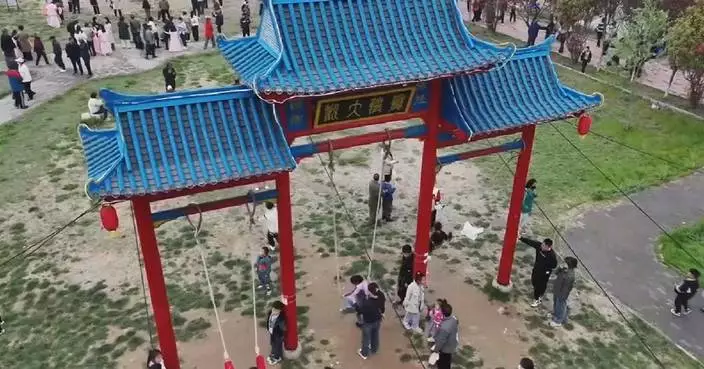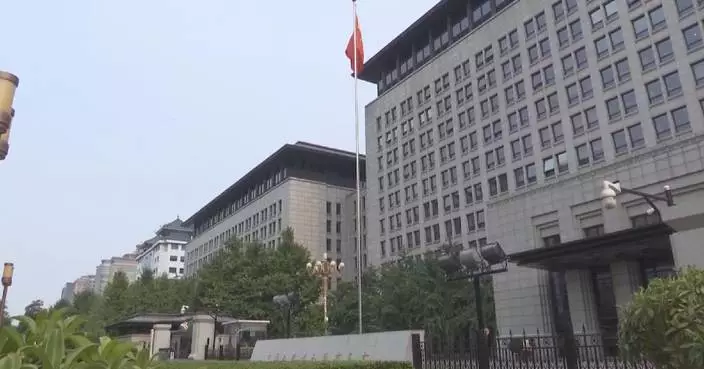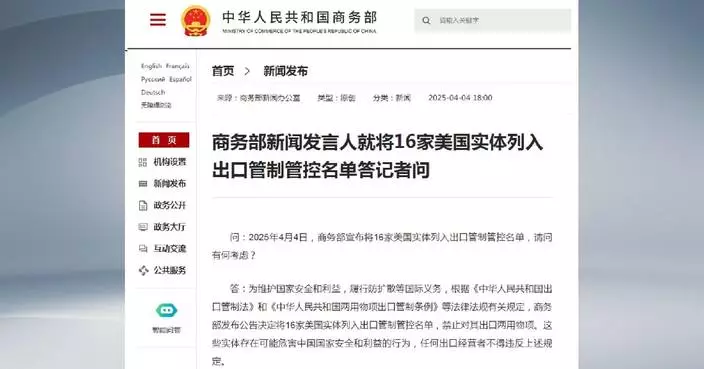As the eagerly awaited 9th Asian Winter Games are just 30 days away Wednesday, the host city Harbin in northeastern China's Heilongjiang Province is embracing the multi-sport event with dazzling Games-themed ice and snow sculptures and thrilling winter activities.
At the world's largest ice-and-snow theme park, the 26th edition of the Harbin Ice and Snow World, the entire facility has been meticulously infused with Asian Games-themed elements, captivating both domestic and international visitors. At the park's eastern entrance, a striking ice countdown clock stands as a popular photo spot for visitors, signaling the anticipation surrounding the Games.
Once inside, guests are greeted by prominent features related to the Asian Winter Games. The Games' theme, "Dream of Winter, Love among Asia," is displayed in giant characters. Flanking the motto are Binbin and Nini, the Games' mascots, inspired by the Siberian tiger.
The China Media Group's ice and snow broadcasting studio, a fixture for the past four years, is also a must-see. Special programming related to the Games will be produced from this unique location.
The park's largest structure, the main tower, takes its design cues from the Olympic Council of Asia (OCA) emblem. Representations of landmarks from the 45 OCA member nations and regions are also featured throughout the park.
A Cambodian media team was seen filming in front of the ice replica of Cambodia's Bayon Temple, a well-known and richly decorated Buddhist pyramid temple built at the end of the 12th century.
"This is an awe-inspiring experience. Our Cambodian influencers have never seen such beautiful ice and snow sculptures. They're eager to explore and share the beauty of Harbin with Southeast Asia and the world," said Li Zhen, the Chinese representative of the Cambodia-China New Media Association.
Ice sculptures of Hong Kong's Golden Bauhinia, Macao's Ruins of St. Paul's, and Taiwan's Taipei 101 skyscraper are also attracting attention and photo opportunities.
"It's truly stunning! Even more beautiful than on television. Seeing it in person is a completely different experience," said a tourist from Hong Kong.
Since its opening on December 21, 2024, the Harbin Ice and Snow World has welcomed 846,200 visits, a 24.7 percent increase compared to the same period last year. Beyond the Ice and Snow World, Harbin continues to offer a range of winter attractions, including the Sun Island International Snow Sculpture Art Expo and the historic Central Street. New experiences like the "Snow Country Train" and ice and snow concerts add to the vibrant winter culture.
From winter sports to tourism, these diverse offerings are stimulating ice and snow consumption and expanding the winter economy.
The 9th Asian Winter Games, scheduled for February 7-14, will feature athletes from across Asia competing in six major events, 11 sub-events, and 64 disciplines.

Harbin's ice wonderland adorned with Asian Winter Games elements, drawing global visitors
A survey released by CGTN to global netizens shows that respondents strongly condemn the U.S.'s unilateral bullying of other countries under the pretext of "reciprocal tariffs," saying that this move may trigger countermeasures from other countries and eventually evolve into a "tariff world war," seriously impacting the world economy.
The U.S. claims that it has suffered losses in international trade and is raising tariffs on all trading partners under the pretext of "reciprocity," aiming to reduce the trade deficit. However, 81.03 percent of global respondents do not agree with this, believing that such measures will not achieve the expected results. During his first term in office, U.S. President Donald Trump imposed tariffs on major trading partners. According to statistics from the American Action Forum, a think tank, Trump's protectionist policies during the first term cost U.S. consumers about 57 billion U.S. dollars annually. According to the survey, 81.94 percent of respondents believe that "reciprocal tariffs" cannot solve U.S.'s own problems but will only harm the interests of U.S. consumers and drag down the U.S. economic growth.
The competitiveness of products from different countries varies. Each country can set appropriate tariffs based on its own products to achieve "mutual benefit" in the international market. The "tariff farce" of the U.S. side is a selective disregard for the balance of interests reached through multilateral trade negotiations. Some 82.8 percent of the respondents point out that in the context of unequal economic development and economic strength of different countries, the U.S. insistence on full and complete reciprocity in tariffs is extremely irrational.
The majority of the U.S. tariffs this time are targeted at developing countries. Regarding this, 82.96 percent of the respondents condemn the U.S. for conducting "indiscriminate attacks" on other countries on the issue of tariffs, believing that this is a deprivation of the development rights of other countries, especially developing countries. According to the survey, 84.43 percent of the respondents believe that the U.S.'s imposition of "reciprocal tariffs" will exacerbate the problem of trade unfairness with its trading partners and traditional allies, seriously damaging the country's credibility.
As a member of the World Trade Organization (WTO), the U.S. has unilaterally and subjectively introduced so-called "reciprocal tariffs" and insisted on implementing them. This is a typical act of unilateral bullying. In response, 79.47 percent of the respondents criticize the U.S. for seriously violating the rules of the WTO. In the survey, 79.58 percent of the respondents say that "reciprocal tariffs" have become a new tool for the U.S. to promote trade protectionism, which will further intensify international trade tensions and global economic fragmentation.
This survey was released on CGTN's English, Spanish, French, Arabic and Russian platforms. Within 24 hours, a total of 9,600 overseas netizens participated in the survey and expressed their views.

CGTN poll: US 'reciprocal tariffs' draw condemnation from world



















































